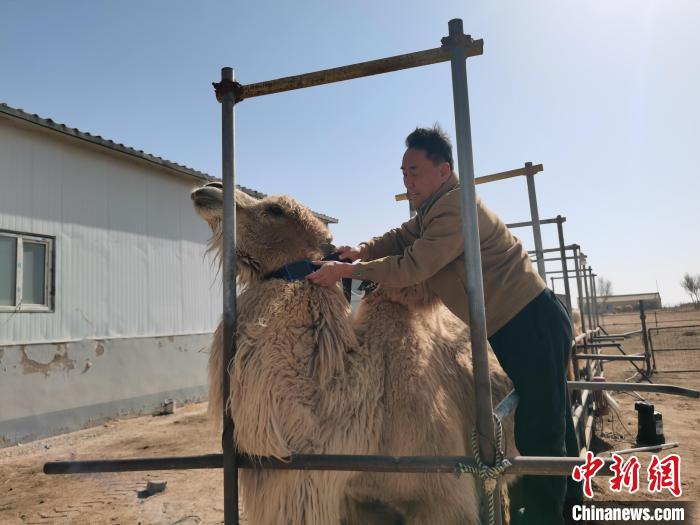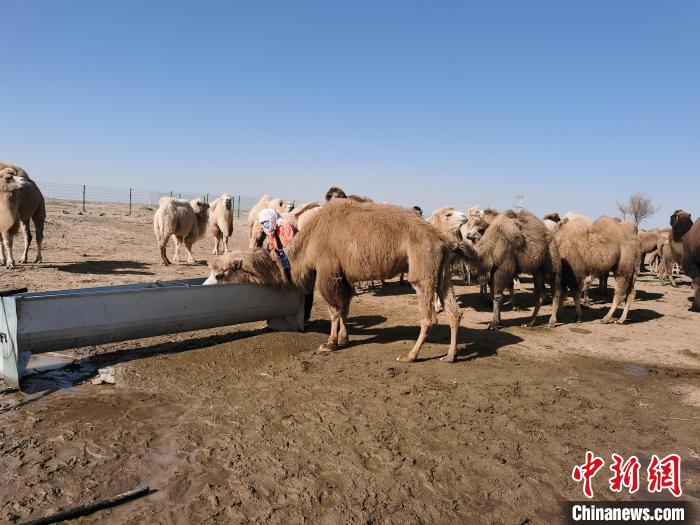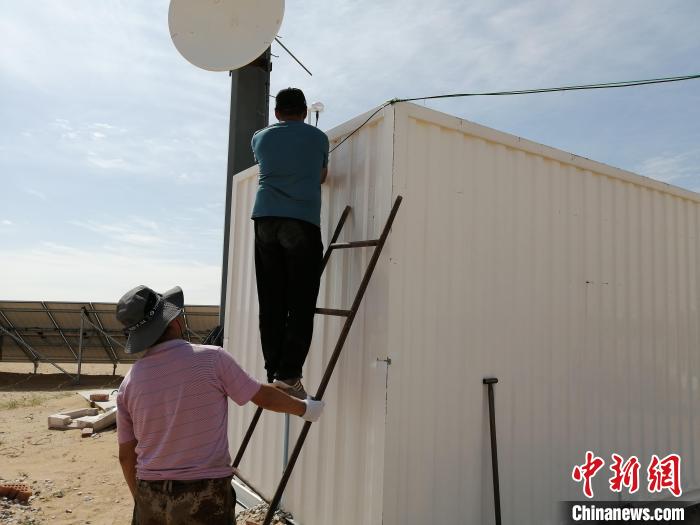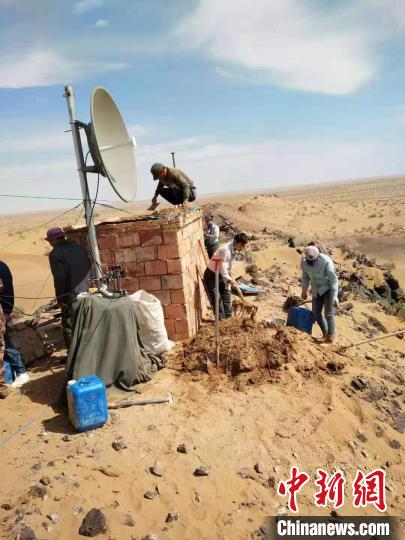Herdsmen use BeiDou-based intelligent grazing system to herd camels in Inner Mongolia
Herdsmen in the Alxa League of north China’s Inner Mongolia Autonomous Region have started to use an intelligent grazing system based on the country’s independently developed BeiDou Navigation Satellite System to remotely “graze” and track camels.
The system enables herdsmen to monitor the real-time location and activities of the animals and find lost ones by using a smartphone app.

Wuni Menghe attaches a navigation collar to a camel. (Photo courtesy of Wuni Menghe)
“In Alxa, a camel moves in a radius of 30 kilometers to 100 kilometers. Sometimes, a herdsman took several months or even more than a year to find a lost camel. Thanks to the intelligent grazing system, herdsmen can easily find lost camels,” said Wuni Menghe, a researcher with a livestock workstation in Alxa Left Banner of Alxa League, and also the inventor of the intelligent grazing system.
“People need such a system, and pastoral areas need to pursue development,” said the researcher who has been engaged in animal husbandry for more than 40 years, adding that Alxa is large but sparsely populated, and what strikes him the most is that farmers and herdsmen are eager to share the benefits of the country’s reform and opening-up.
Alxa League is also one of the areas most affected by water scarcity in China and the hospitable area in the league accounts for only 6 percent of its total area, which poses a challenge to herdsmen who dwell in scattered areas as they need more grasslands to meet the needs of livestock farming and protect the local ecology. In the past, they had some difficulty accessing telecommunications services.
Wuni Menghe began to develop the intelligent grazing system suitable for camels in 2000. Using the Internet of Things (IoT), information such as herds’ information and movement are connected to monitoring equipment to realize intelligent identification, positioning, tracking, monitoring and management. The system can identify remote grazing areas while providing automatic data, a real-time grasp of pasture information, and timely acquisition of unusual and abnormal conditions.

Photo shows camels, one of which is attached with a navigation collar, drinking water. (Photo courtesy of Wuni Menghe)
Facts have proven that camel herders can save at least 50 percent of grazing time and grazing costs of at least 5,000 yuan ($723) per year.
Tumen Bateer is one of the beneficiaries of the intelligent grazing system. He raises over 100 camels on a desert pasture covering over 60,000 mu (4,000 hectares) in Alxa Right Banner but lives in Badain Jaran town which is over 100 kilometers away from his pasture. “Thanks to over 10 navigation collars attached to my camel herds, I can receive their position information on my mobile phone regularly,” the herder said.
Over 500 herding households like Tumen Bateer’s family in Alxa have used more than 2,000 sets of Beidou positioning equipment to manage 20,000 to 30,000 camels.
In addition to the intelligent grazing system, Wuni Menghe also took the lead in developing an intelligent drinking water system. Based on the systems, a project of intelligent management of ecological animal husbandry on the Alxa desert grassland was selected as an outstanding case for national intelligent agriculture development in 2022.
In a village nestled deep in the Badain Jaran Desert, 12 herding households, including Jiri Gere’s family, stay connected to Wi-Fi signals from tens of kilometers away thanks to Wuni Menghe. “Now we can have a video chat smoothly and attach navigation collars to camels,” the man said.

File photo shows people installing facilities that enable herdsmen to have access to internet services. (Photo/Jiri Gele)
According to Jiri Gere, the 12 herding households could only contact one another through interphones in the past because there were neither internet services nor cellphone signals. He said that optical fiber and 4G networks were established 80 kilometers from the village in 2019. One year later, Jiri Gere’s home got access to internet services.
Wuni Menghe said so far, over 1,000 herding households have had access to Wi-Fi signals, which enables them to use the intelligent grazing system and the intelligent drinking water system.
Alxa’s successful experience has been extended to other areas of Inner Mongolia, as well as Gansu and Qinghai provinces in northwest China.

File photo shows people building facilities that enable herdsmen to have access to internet services. (Photo/Jiri Gele)
Photos
Related Stories
- In pics: camel race in El Alamein City, Egypt
- Confusing domestic Bactrian camel with wild camel detrimental to latter's survival: study
- Camels seen during King Abdulaziz Camel Festival in Saudi Arabia
- Camel breeding develops into pillar industry under promotion policy in Xinjiang
- Herdsmen drive camels to summer pastures in Jiuquan, NW China
- Old camel treks 100 kilometers back home after being sold
Copyright © 2023 People's Daily Online. All Rights Reserved.









